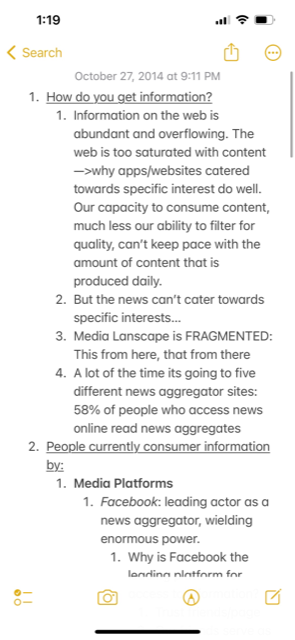I stumbled upon a note I wrote in 2014, almost a decade ago when I was 22.
I remember writing this vision down unaware whether or not the current state of tech would allow for any of it—it didn’t, well, not really.
I outline a vision of creators getting paid for their content, and where content is easy to curate and discover. A vision of democratized data and decentralized sources that also ensure authenticity and truth.
Today, 8 years later, the technology exists to make this vision a reality. While decentralized and distributed architectures are in their infancy—they are real and possible and attracting attention. I think web3 protocols and primitives, like Lens or Blueskye, are promising for the future of social tech, and I’m excited by the people behind them, like Stani Yulechov and Jay Graber respectively.
Anyway, it’s really wonderful to read this note and see that it’s still essentially the same problems and resulting thinking that I’m working on today after quitting Getty and pursuing the social tech space.
Here’s a raw copy-and-paste from my notes app, inclusive of mistakes to preserve the integrity of 22-year-old Catherine :)
October 27, 2014:
How do you get information?
Information on the web is abundant and overflowing. The web is too saturated with content—>why apps/websites catered towards specific interest do well. Our capacity to consume content, much less our ability to filter for quality, can’t keep pace with the amount of content that is produced daily.
But the news can’t cater towards specific interests…
Media Lanscape is FRAGMENTED: This from here, that from there
A lot of the time its going to five different news aggregator sites: 58% of people who access news online read news aggregates
People currently consumer information by:
Media Platforms
Facebook: leading actor as a news aggregator, wielding enormous power.
Why is Facebook the leading platform for access to information?
Trust friends/page
Our friends serve as our editors
Problem with this: Content shared is manipulated by the human touch/filtering-- content shared is driven by social norms, there is a lack of diversity of content
Twitter, google news—also exert large influence
Editorial judgement
Social bookmarking pages as search engines
Search Engines that use algorithms
Computers curating through algorithms
Current state:
Facebook:
Currently seeking out quality content
Facebook collaboration with publishers: Frames company’s relationships with publishers as mutually beneficial —publisher promotes content on Facebook, users have more engaging material, publishers get increased traffic driven to their site…increased traffic: publisher can increase advertising rate or convert readers into subscribers.
Currently throwing around the idea of publishers sending pages to Facebook that would live inside the social network’s app and be hosted by its servers—>split ad revenue
Media Conglomerates: No longer creating content for the way content is currently consumed.
**Publishers are reaching readers through individual pieces rather than complete editions
Ability of computers to curate news is poor —>traditionally a role played by editors
Mr. Cottrell at the Browser: Skims 1000 articles a day and publishes 6 a day that he finds interesting for about 7000 subscribers that pay 20$ a year
What I’m proposing:
A disruptive news media platform that is built on:
Serving as the #1 source of traffic for digital publishers, controlling for quality content
People acting as influencers as well as publishers
Stock of influencer? —changes with real-time feedback of quality of content shared. As published or shared article gains attention, influencer has momentary wealth, value goes up. Adds deliberation and purpose behind every act of sharing.
Influencer builds on the stock they have any time they get attention, and the larger their audience at one time—the larger their potential audience in the future. Obtaining attention is obtaining a kind of enduring wealth… attention wealth can decline, only to revive later…rarely entirely lost
As attention decreases, “wealth” and stock of influencer readjusts itself
Real time, instant accessible audience
Participatory democratization: reddit-like system of upvoting and down voting
Attention economy: influencer stock, real-time evaluation of credibility of influencer.
Equal access to information, equal opportunity for everyone to participate. exchange of ideas in real-time.
What does this look like?
One part dedicated to who we follow
One part dedicated to aggregating news based off of computer analyzed metrics (what device consumer is on, #of comments or likes, how long reader spends on an article)
One part dedicated to participatory democratization —to ensure robust exchange of diverse viewpoints
—one article, coming from one source—aka it’s only published in one place.
—>when an article is consumed through someone we follow, when we like or dislike it through the person we follow—it affects its positioning on the total overall reddit like part…and yet, the original publisher retains total property and identity to content published
-->it provides equal opportunity to everyone to participate, get rid of it being a system of social feedback--it should be based off of substance and value, not a reflection of identity--,participatory democratization, the ability to communicate to an instant accessible audience, it's data in real time, *add deliberation and purpose behind every act of sharing, nothing personal, attention economy,

